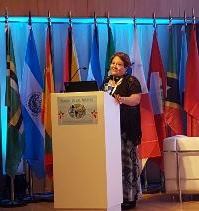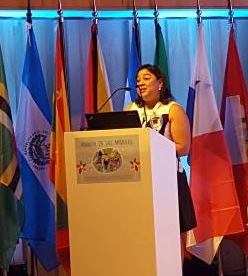
Workshop 1 on the prevention and sustained eradication of child labor concluded in the framework of the preparatory meeting for the IV Conference
23 de February de 2017
Share
The Regional Initiative Latin America and the Caribbean free of child labor opened the day today.
The participants of the preparatory meeting for the IV World Conference on Child Labor began their meeting with Workshop 1 "Prevention and Sustained Eradication of Child Labor"; which aimed to debate, under a regional context, about the situation in which the 12.5 million children and adolescents who are victims of this reality live, in such a way that they could identify and define priority issues and approaches to implement the Accelerating Policy Framework proposed by the Regional Initiative and achieve a Latin America and the Caribbean free of child labor by 2025.
The panel of experts was made up of Elena Montobbio, from the Technical Secretariat of the Regional Initiative; Susana Santomingo, Focal Point of the General Confederation of Labor of Argentina for the Regional Initiative; and, Marisol Linero, Focal Point of the National Council of Private Enterprise for the Regional Initiative.
 |  |
| "The Regional Initiative is an instrument of accompaniment, a sphere of dialogue and consensus." Susana Santomingo | “The Regional Initiative comes to get us out of stagnation after a significant reduction in Latin America. I am sure that we will be the first region to be Free of Child Labor ”. Marisol Linero |
Andrés Espejo, Consultant to the Economic Commission for Latin America and the Caribbean (ECLAC), was also part of the panel of experts. It is worth noting that ECLAC is currently working hand in hand with the International Labor Organization (ILO) to create a predictive model that identifies the areas where there is a greater risk of child labor and thus open the possibility for multisectoral interventions in the countries are more concentrated and effective. Along these lines, Andrés Espejo explained in greater detail the Accelerating Policy Framework to put an end to child labor, previously built under this ILO-ECLAC alliance.

After the panel, the participants began group work to answer, according to their experience as a country and sector, three key questions regarding: 1) how to improve the financing of programs and services to reduce child labor and protect work allowed adolescent, 2) how to ensure that the ministries of social development and education are more effectively linked in the actions and 3) what should be the role of civil society to contribute effectively to the reduction of child labor and the protection of the adolescent work allowed in the region. At the end, each team shared their findings with the other groups.
In this regard, Sandra Edibel Guevara, Minister of Labor and Social Welfare of El Salvador, represented her group during the presentation and pointed out, among other things, that it is important to align resources through international cooperation; generate inter-institutional alliances with the education and social development sectors, bearing in mind that part of their resources should be allocated to preventing child labor; and that the participation of civil society is important for a comprehensive and tripartite approach to child labor.
About the Accelerator Frame
The accelerator framework proposed by the Regional Initiative Latin America and the Caribbean free of child labor is a response that seeks to improve and strengthen the articulation of actions in a regional context where the stagnation of the figures for the reduction of child labor prevails.
The Accelerator Framework recognizes that it is necessary to urgently attend to children and adolescents in this situation. In addition, it emphasizes the need for an intentional and planned preventive action that interrupts the trajectory of child labor, identifying children and adolescents at risk and that includes the offer of existing social protection services, both to them and to them. their families, to prevent them from entering the labor market prematurely. And when they meet the minimum age allowed for admission to employment, do so in one with conditions allowed and appropriate for their age.
We invite you to watch the video on the Regional Initiative Accelerator Framework, here .
Comments

América Latina y el Caribe: Cooperación regional para una generación libre de tr...
12 de September de 2024
En el Día de las Naciones Unidas para la Cooperación Sur-Sur, la Iniciativa Regional América Latina y el Caribe Libre de Trabajo Infantil celebra el f...
.png)
Desigualdad, educación y trabajo infantil
07 de August de 2024
La Inicitiava Regional América Latina y el Caribe Libre de Trabajo Infantil, llevará a cabo una mesa de discusión en la que se presentará el estudio...
Brazil and Belize strengthen response to eradicate child labour
01 de July de 2024
Brazil and Belize, two member countries of the Child Labour Free Latin America and the Caribbean Regional Initiative*, held a workshop on the exchange...
.jpeg)
Sumando esfuerzos para que América Latina y el Caribe sea una región libre de tr...
21 de June de 2024
En conmemoración del X aniversario de la Iniciativa Regional y el 25 aniversario del Convenio 182 de la OIT, se llevó a cabo un seminario de dos días...

Una década de lucha contra el trabajo infantil: Países de América Latina y el Ca...
12 de June de 2024
la Iniciativa Regional cumple 10 años de trayectoria, y para iniciar la conmemoración de este X Aniversario, sus integrantes han co-creado un mural e...
